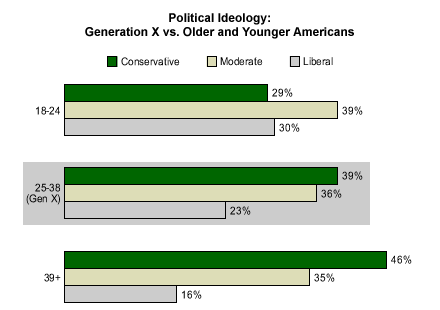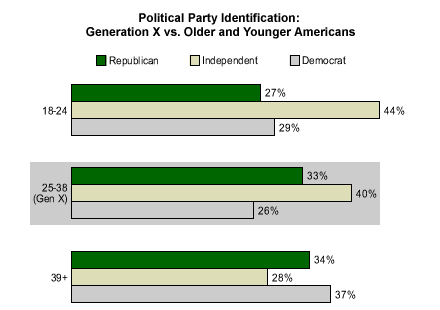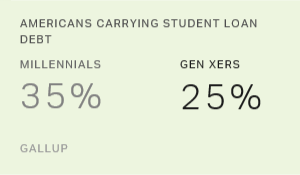While 18 is the legal age of adulthood in America, many young adults don't really begin to act "grown up" until they turn 25. The average marrying age is 27 for men and 25 for women, and people over 25 are more likely to have finished their formal education and settled into one community. Even insurance actuaries recognize this secondary rite of passage toward adulthood; car insurance rates go down when people turn 25.
Politically, the pattern holds true as well. As Americans age and begin to plant roots, the likelihood of them voting increases. This knowledge will be especially important to political strategists this year, as the last of a generation of Americans known as "Generation X" (adults currently between the ages of 25 and 38) will politically "come of age" before the 2004 election.
You Might Think They're Liberal
Although their generation was once defined by the alternative rock scene of the 1990s, aggregated Gallup data from the past three Gallup Moral Values polls* suggest that Gen Xers -- like the general public -- are more likely to identify themselves as being politically conservative than liberal. Overall, the data indicate that conservatism increases with age, and Generation X is no exception to that rule.
Roughly two in five 25- to 38-year-olds identify themselves as conservative, while 36% say they are moderate and 23% liberal. The youngest group of adults, those aged 18 to 24 and born after Generation X, are more liberally oriented -- 30% identify as liberals, 29% as conservatives, and 39% as moderates. Americans born before Generation X are much more likely to say they are conservative (46%) than liberal (16%) or moderate (35%).

Within Generation X, political ideology varies somewhat by gender. Men are more likely than women to identify themselves as conservative (45% to 34%), and women are more likely than men to identify themselves as liberal (26% to 19%).
Political Potential
When it comes to political party, Gen Xers are less likely than older Americans to identify with either of the two major parties. Four in 10 adults aged 25 to 38 identify themselves as political independents, compared with 28% of those over the age of 38 who say they are politically independent. As an age group, 18- to 24-year-olds are similar to Gen Xers in having a high proportion of independents (44%).
Gen Xers show a preference for the Republican over the Democratic Party by 33% to 26%. In contrast, the parties are more closely matched among those born before (37% Democrat and 34% Republican) and after (29% Democrat and 27% Republican) Generation X.
However, when the political leanings of independents are taken into account, the parties are more evenly matched in Generation X, with 47% identifying as Republicans or leaning to the Republican Party, and 44% identifying as Democrats or leaning to the Democratic Party.

Bottom Line
Many Gen Xers have not established themselves politically, with 4 in 10 saying they are political independents. The group is essentially a metaphorical ball resting atop a hill, with potential to roll either way. While this group shows a tendency to be more Republican and conservative than those born after them, their ultimate effect on future elections will be determined by how many of them show up at the polls on Election Day.
*Results based on an aggregate of telephone interviews with 3,028 American adults, aged 18 and older, conducted from 2000 through 2002. For results based on the total sample, one can say with 95% confidence that the maximum margin of sampling error is ±2%.
